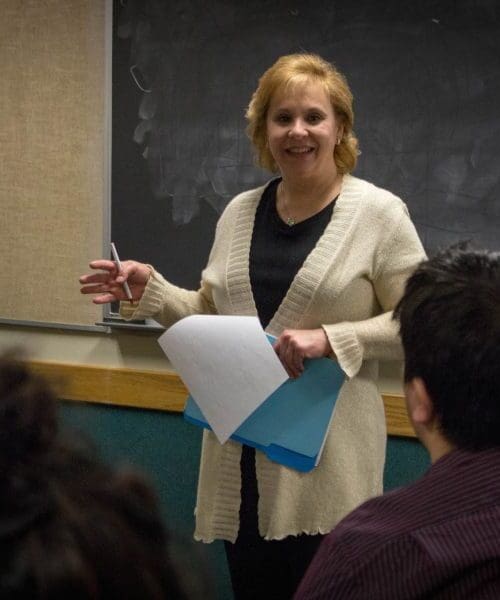Lionhearted Leaders: Mary Beth O’Connor

Mary Beth O’Connor engages students with innovative and activity-based learning
Students of Mary Beth O’Connor, associate professor of Communication at Purdue University Northwest (PNW), have won more than 100 prestigious awards for the work they’ve done in the classroom. Many go on to successful careers within the television and film industry, often winning industry awards.
A unique approach
Creating an innovative and active learning environment is one of the hallmarks of O’Connor’s approach to teaching. She attributes her use of experiential learning with being able to provide her students an engaging educational experience. “I look at learning outside of test taking,” explains O’Connor. “I use experiential and activity-based teaching in my courses. It’s more effective and provides students with a richer learning experience.”
One example of O’Connor’s innovative approach is the Visual Aesthetics in Television and Film course, affectionately dubbed dinner and a movie. The course has no traditional homework or tests and students are graded on attendance and one assignment. The course examines visual aesthetics such as acting, cinematography, directing and other elements of television and filmmaking with an emphasis on identifying and understanding themes. “One of the most important elements when telling a story is to be able to identity themes,” explains O’Connor. “It’s also essential in understanding the universe in which a visual story takes place.”
Students are put into small groups with each group assigned a different film or television show. Each group must extrapolate the themes from the story, then plan a menu, an activity and decorations based on those themes. O’Connor meets with each group multiple times to help them plan and define how each menu item, activity and decoration must connect to the story’s visual themes.
Each week a different group hosts the class which begins with O’Connor lecturing on the significance of the film, why they’re viewing it and what important elements students should be watching for during the viewing. “Once students enter the classroom, it becomes an immersive experience,” says O’Connor. “We eat, watch the film and then discuss the film’s themes and visual elements. The students have to have learned the themes by the choices in food, decorations and activities. It’s something new each week and a fun way to learn.”
Active learning
Well-known in the field for her approach to scriptwriting for television, O’Connor uses a proprietary method she developed to teach screenwriting. The course has no book and the students don’t actually start writing until the last month of the semester. “You can’t just have students start writing on the first day of class,” says O’Connor. “They have to have a foundation to write. So I help them prepare for writing with creative and imaginative assignments, activities and research.”
She also teaches Practicum in Media Communication where students produce “The Roundtable Perspective,” a half-hour educational program that airs on Northwest Indiana PBS affiliate, Lakeshore PBS.
O’Connor designs her classes to be a cooperative and community effort which helps her students learn about the world and themselves. “Television is a cooperative business,” she says. “I set my students up to cooperate with each other, not compete. The more they help each other, the more they learn to help themselves. That’s the lesson.”
Born to teach
Mary Beth O’Connor admits she was born to teach. Specifically, to teach communication. “I’m one of those people who knew from the time I was very young what I wanted to do,” says O’Connor. “I always wanted to do two things: be a teacher and go into television. I never really had a choice, it was just what I was going to do.”
As a child, O’Connor would write plays and have neighborhood children act them out under her direction. When she wasn’t directing her playmates on the stage, O’Connor was teaching them in a play classroom by imitating her teachers. “Whatever my teachers were teaching me, I would teach all of the younger kids on the block,” says O’Connor. “They were very prepared by the time they went to school.”
The art of teaching
Effective and appropriate pedagogy, or the art of teaching, is a topic that has always held O’Connor’s interest. She acknowledges her early struggle with dyslexia eventually led to her interest in understanding the process of learning. “I had to learn very methodically and very carefully and that taught me teaching strategy,” says O’Connor. “I’m interested in all aspects of teaching, especially in how one learns and processes information. My scholarship focuses on how to competently teach — what works, what doesn’t work and why.”
O’Connor has authored several papers, presented at conferences and organized panel discussions on pedagogical approaches to teaching using her more than 30 years of her experience in the classroom.